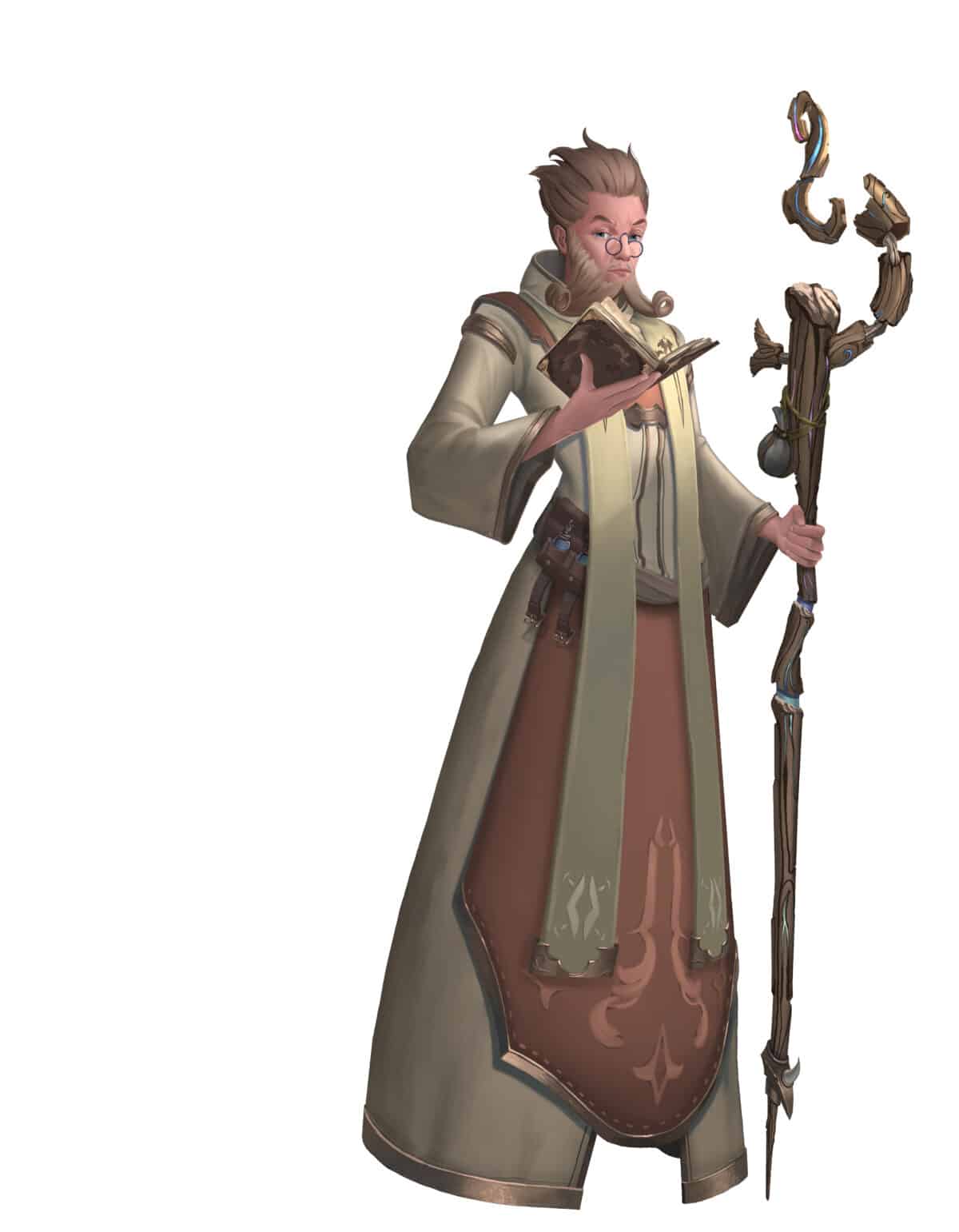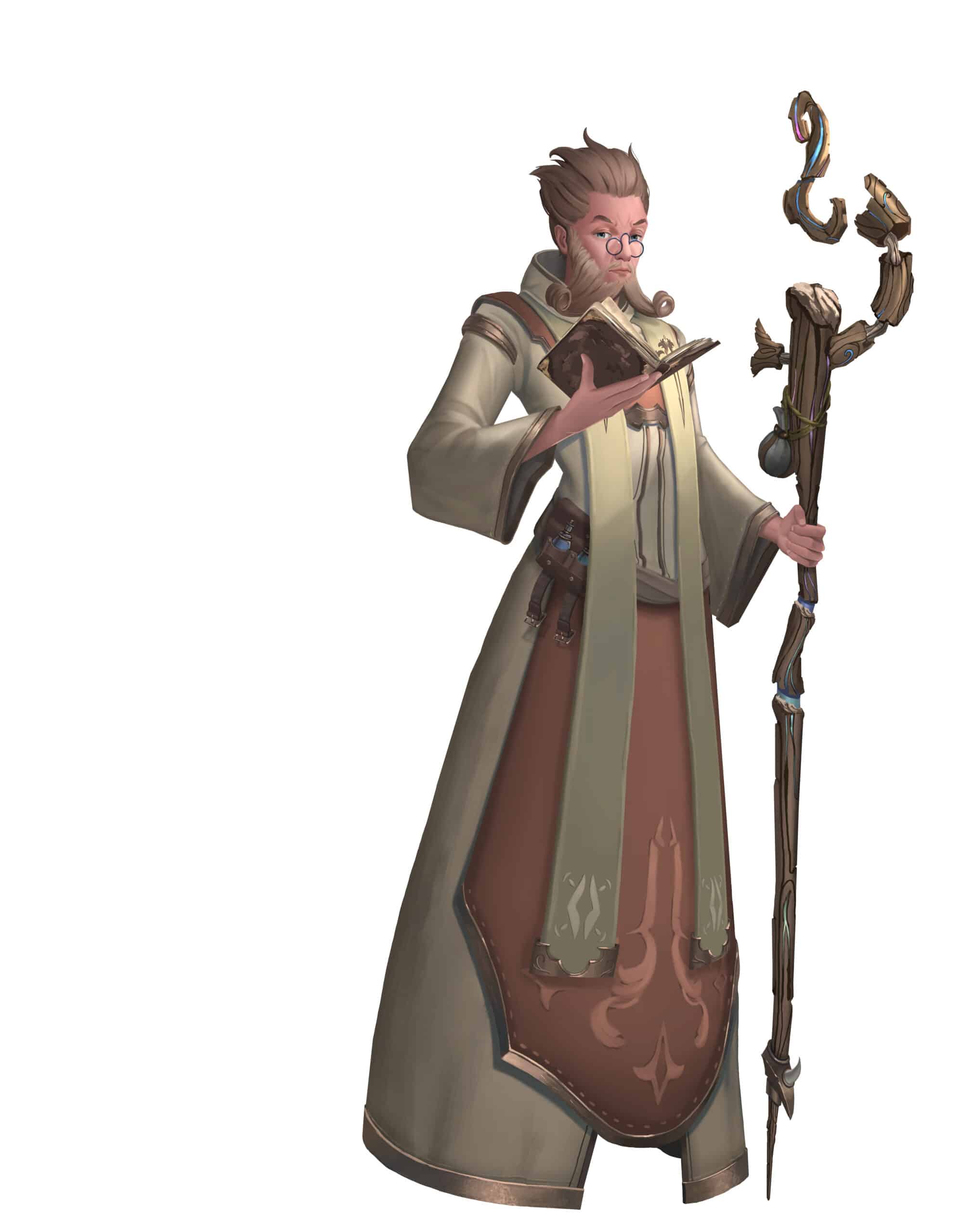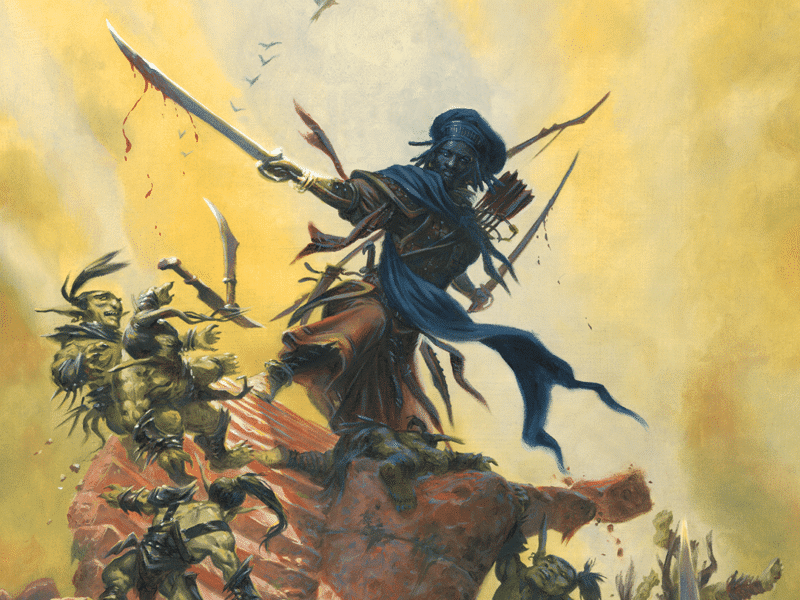In many Dungeons & Dragons adventures, there are many characters other than those controlled by the players who can have a great impact on the success (or failure) of the heroes in completing their quest, and on the general impression of the adventure on the players. These characters are known as NPCs, which is short for Non-Player Characters. They are effectively people – and, sometimes, monsters – who are controlled and enacted by the Dungeon Master (also known as the DM).

Face(s) of Your World
An adventure can have zero NPCs. For example, a DM can simply start a session by telling the players that “your characters have been hired to clear out a goblin-infested ruin in the nearby woods”. Off the heroes go towards the destination in search of pesky goblins! When the quest is over, the DM tells them that “you are rewarded with a sack of gold coins and a Sword of Sharpness”. And like that, the mission is over, without the characters interacting with anyone but the other members of the adventuring party.
However, the introduction of NPCs has a very immediate and palpable effect as they enable the players’ characters to interact with other people in their shared imagined world. NPCs add the opportunity to have quest givers with different agendas, allies who can offer help or advice, and villains who try to deceive the adventurers. They can also populate busy town plazas and crowded rowdy taverns, and thereby contribute with a sense of liveliness and action in the setting described by the DM. Moreover, if you’re the kind of DM who likes the odd burst of theatrics, NPCs provide endless opportunities for trying out different mannerisms, voices, and personas. In short, NPCs help with breathing life into the imaginary universe of your setting.
But what makes an NPC truly shine? How does one build an NPC that takes on a life beyond its list of stats and skills? What does it take to create NPCs who leave a lasting impression on the characters and, more importantly, the players? That’s what this article is all about! Read on for a few quick and easily implementable tips and tricks for making NPCs with flair.
The Basics
For NPCs to be really effective, as in engaging and unforgettable, there are two basic requirements that they need to meet. Firstly, they need to feel at home in your setting. This goes far beyond just their names and appearances. While a fitting name and appropriate clothes help, what truly anchors NPCs in a particular place in your world is found in why they are there, and how they fit in where they are.
Just having specific origins can immediately give the NPCs a little more depth. For example, the blacksmith in a remote hamlet in the mountains may have grown up five steps from the smithy and come from a long line of blacksmiths, all of whom have lived in the same place. But alternatively, the blacksmith could be a dwarf whose living among humans since only a few years back, and who arrived there from a dwarven stronghold halfway across the realm following a great battle. Similarly, while the former blacksmith might be dreadfully bored with village life and long to travel the world, the latter kind could be seeing the village as a sanctuary far from the dangers of war, and be wary of wandering out of sight of the village hall.
Secondly, any NPCs who will be critical to the story of the adventure should all be connected to your players’ characters in one way or another. This is usually quite easy to set up: they can be old comrades in arms or distant relatives, members of the same thieves’ guild or druid circle, or just a trusted friend’s friend.
What’s That You Hide Behind Your Back?
The NPCs can be people who have something that the players’ characters want. Exactly what it is that the characters want can be mundane but fairly important, such as a travelling merchant who happens to have a few healing potions or some specific spell components for sale. (In our campaign, there is one such merchant – Bugo Silverklirr – who has been recurring for more than twenty years in this particular role!).
But the NPCs can also be in the possession of much more vital items, such as a key that’s needed to unlock an ancient tomb, or a special spell scroll required to open a portal to a dungeon in another dimension. These NPCs naturally become very interesting to the players, so it’s a good idea to prepare them accordingly.
Give Me That!
Closely related to the above point is the importance of an NPC’s desire. A good and striking NPC always want something (or someone) that they don’t have. If they’re ready to walk miles and cross any bridges to get what they want, all the better! People – including imaginary such – who have a strong desire often make a mark in social circumstances and attract interest, especially if their need is suppressed but still evident. Such people are usually associated with proactiveness and intensity – which, after all, is what fantasy adventures are all about.
It’s good to let the desires and behaviours of the NPCs change over time. For example, a barkeep who initially is suspicious and reserved may become more friendly after a few days, or a hunter might change from being quiet to more talkative because they slowly get to know the characters. An NPC can also become more withdrawn or wary, which might tip the characters off that something is troubling them.
A Special Look and Feel
Another important part of creating great NPCs is to give them distinct features. These can be physical, such as unusual or otherwise highly noticeable appearances – very large eyes, startling hairstyles, surprising jewellery, or something similar. But it can also be a mannerism, such as twitchiness, a tendency to tilt their head when listening, persistent smiling or scowling, and so on.
Other distinct aspects of an NPC can be hidden a bit deeper in their persona. For example, the adventuring party might pay a visit to an armourer in a town. During the visit, a sharp-eyed member of the group might notice that armour vendor has a large number of locks on the door, and that there are numerous loaded crossbows hidden around the room. If they ask the armour vendor about this, she might respond that she is taking extra precautions as she has a past as a bodyguard of a guild leader with many powerful enemies.
“Why did you work as a bodyguard?” one of the characters might ask.
“Oh, it seemed to be a simple profession after my long career as a mercenary,” the armour vendor replies. “Those were perilous times. Here, look at this nasty scar from a wound that almost killed me. That was long before the betrayal, of course. All because of something I overheard. Rumours are dangerous things. I still keep my ear to the ground, but these days, I choose my friends carefully…”
Suddenly, the armour vendor is a person with real depth whom the characters might be interested in seeing again in the future! The advantage of these more ambiguous and discreet characteristics is that once they have been revealed, they really help to pique the players’ interest and make an NPC much more intriguing.
The Impulse to Aid
Another way to make players’ ears perk up when they learn details about an NPC is to give them a background that’s both impactful and quick to reveal. Examples of this include the suggestion that the NPC has a secret of significant importance – because most people tend to like secrets! The NPC can also have a past that’s shaped by a major tragedy such as a great loss, some dreadful injury, perhaps a terrible scare, or a hideous ordeal. Most of the time, players will be naturally caring of or generous to someone who has gone through serious trouble of this kind. Likewise, an NPC who clearly is very vulnerable or exposed to danger often does wonders to attract both attention as well as pity from the adventurers.
Depending on the structure of the adventure and the players’ actions, it can sometimes become important to signpost that these characteristics are flavour and not crucial plot points that the players’ characters are meant to investigate further. There’s nothing wrong in deliberately planting such decoys, commonly called “red herrings”, in order to tempt the players onto the wrong track – but this should be done sparingly and for good reason, such as letting a crook get away with another crime while the adventurers aren’t looking.
Final Words
This concludes the list of ideas for how to develop fascinating NPCs! So go ahead and arm yourself with these easy tips, think up a few curious and notable people, and sprinkle them into your adventures. Your players – and their characters – will appreciate them, and some NPCs may turn out to be returning time after time.







